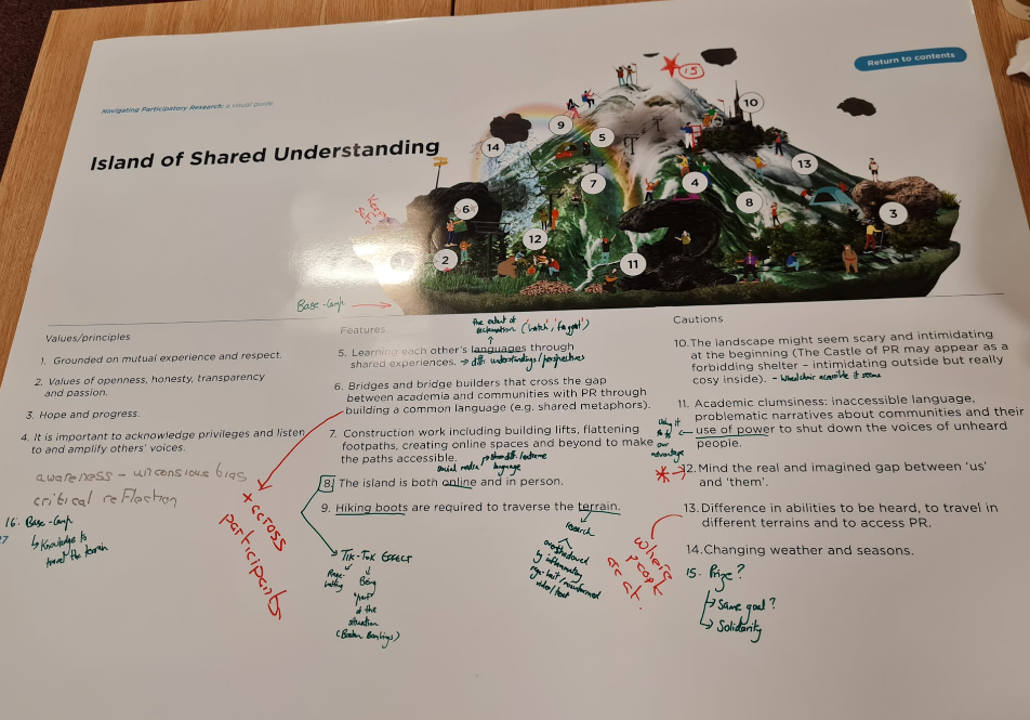PRILL – Phase Two

The Bringing the ‘Visual Guide to Participatory Research’ back to the Communities project, ran from September 2023- January 2023, offering a series of workshops focused on supporting learning and capacity building for undertaking participatory research for young people, professionals and community organisation members supporting sex worker communities.
The project was facilitated by academic and community partner members of the Centre for Social Justice and Community Action – an interdisciplinary, internationally known research centre that supports and promotes participation action research for social justice.
The project builds upon the success of the Participatory Research Innovation and Learning Labs (PRILL) project, which ran from March – July 2022, offering a series of five workshops, in the format of labs, for Durham University staff and postgraduate researchers and members of community organisations interested in, or with experience of, participatory research (PR). Funding was awarded by the University from its 2021-22 UKRI Research England participatory research funding allocation.
The PRILL project aimed at building on the experiences, aspirations and examples of good and ethical practice for doing PR culminated in the creation of The Visual guide to Participatory Research which introduces an alternative learning experience for understanding and reflecting on the complexities, considerations and possibilities of participatory research through creative methods including mapping, collaging and arts creation.
The Bringing the ‘Visual Guide to Participatory Research’ back to the Communities project project focused on piloting the Visual Guide with two community groups: young people and sex workers and practitioners, based in the Northeast of England, with interest in or experience of doing participatory research. The project’s key aims were to:
- Adapt the visual guide for working with specific communities (replicate key activities and adjust to particular learning needs, interests and skillsets);
- Develop community-specific knowledge and university processes (ethics and infrastructure) for conducting PR;
- Develop a CPD model for promoting community-based PR applicable in non-sociology disciplines.
Each community group was invited to participate in a total of 6 half-day workshops, focusing on the following themes:
- Introduction to participatory research: Values, principles, approaches and participatory ethics, with examples relevant to the community group
- Visual guide session (I): Initiating engagement and maintaining relationships
- Visual guide session (II): Shared understanding
- Visual guide session (III): Input and process
- Visual guide session (IV): Output and ownership
- Ethical review and university processes that can foster collaboration
A principal intention of the project was to implement and evaluate the use of the Visual Guide as a learning tool to facilitate engagement and reflection on learning about participatory research, aimed at better supporting the use of the Visual Guide as an accessible and adaptable learning tool for a range of different learning needs and skillsets. The project’s key outputs include:
1. An evaluative report on the project aims, processes and outcomes supported by the workshops.
2. Two practice briefings, one for each community group. It will document how the community members think they should be involved in PR in terms of ‘initiating engagement and maintaining relationship’, ‘promoting shared understanding’, ‘distributing resources and managing input’ and ‘managing output and ownership’. Recommendations about how to adapt the visual guide will be documented in the production of the practice briefing.
3. One website for PRILL: Created to promote the PRILL project as a learning and innovation package; offer information into the project’s two pilot phases; make the visual guide downloadable; and provide community-specific adaptations available for potential users.

